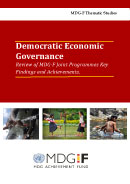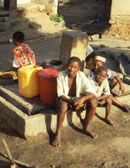

Gobernanza económica democrática
 Ensure Environmental Sustainability
Ensure Environmental Sustainability
Good governance is an influential factor in achieving the MDGs.
In Bosnia & Herzegovina, the MDG-F directed US$1.25 million of investments in small infrastructure projects to increase water supply coverage. In Honduras, we leveraged nearly US$4 million from the Central American Economic Integration Bank for rural infrastructure, bringing water and sanitation to nearly 35,000 people. And in the Philippines, the government has agreed to provide $230,000 to develop water supply systems in each of the 36 municipalities served by MDG-F initiatives.
These efforts contribute directly to meeting the MDG target of halving the proportion of people without sustainable access to safe drinking water by 2015, one of the targets of MDG 7.
RESULTS OF OUR WORK:
- 440,000 citizens gained access to safe affordable drinking water.
- 31.7 million people improved their lives through 41 new laws, 78 policies and 157 plans to boost water and sanitation services.
- 669 community organizations and 665 local providers were strengthened or created to promote community empowerment and participation in water management.
Click here for a complete report of the indicators and results achieved by the MDG-F’s 11 joint programmes on Democratic Economic Governance.
Success Stories

Principales hallazgos y logros
Este informe captura los principales resultados y experiencias de los programas del Fondo ODM en esta ventana temática y presenta su impacto en las vidas de comunidades en las cinco regiones. Elaborado por un experto independiente, el estudio se basa en una extensiva revisión documental, entrevistas con programas conjuntos seleccionados y un análisis detallado y resumen de las aportaciones y contribuciones.
| Resumen ejecutivo | Descargue el informe completo |

Democratic Economic Governance Database
Experiences and lessons learned from the MDG-Fund's 11 Joint Programmes have been gathered in a database to facilitate the sharing of knowledge about how to strengthen democratic economic governance in the water and sanitation sector. Among the areas explored are sector coordination, public participation, community management and model contracts.
|
Nombre del programa conjunto
País
Áreas programática del F-ODM
|
